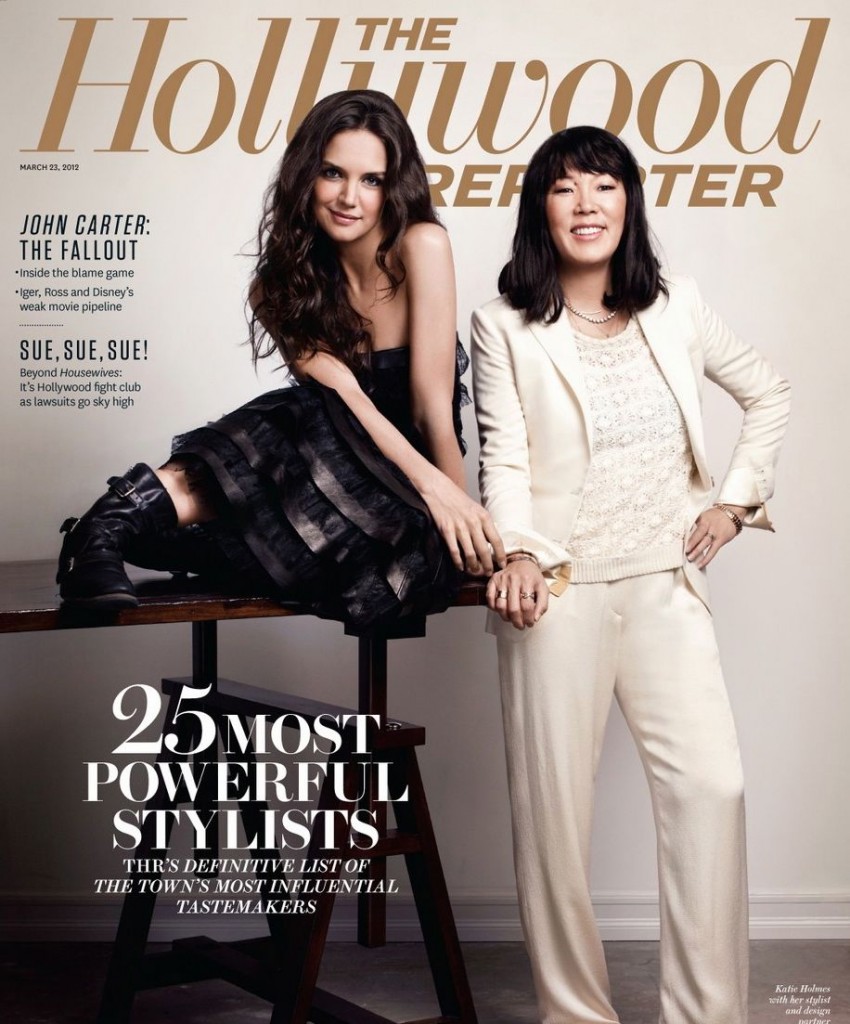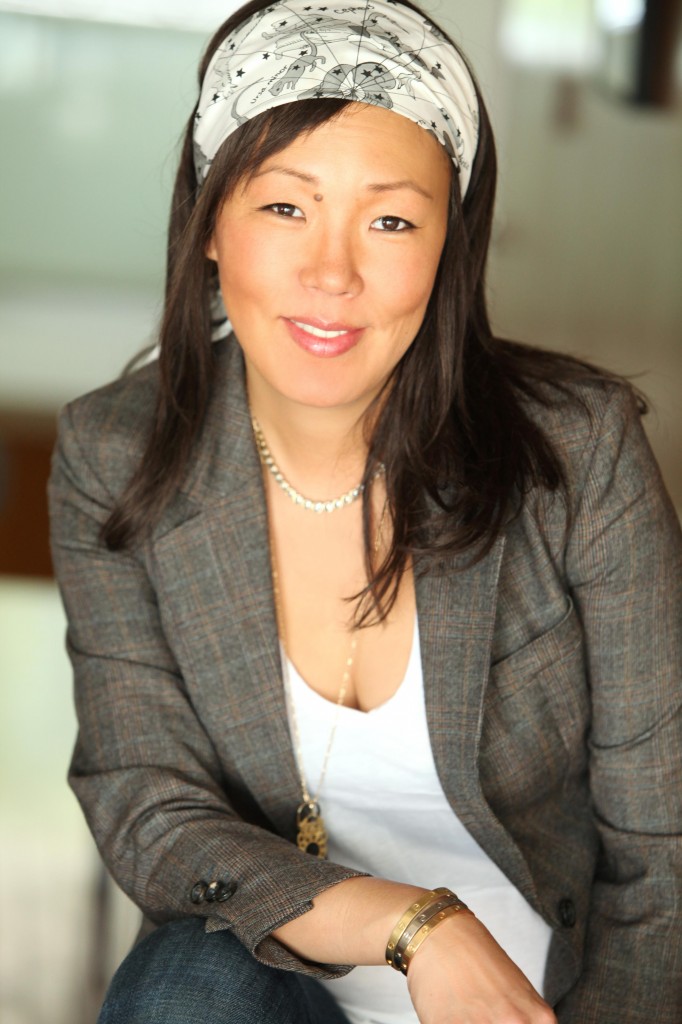- California Assembly OKs highest minimum wage in nation
- S. Korea unveils first graphic cigarette warnings
- US joins with South Korea, Japan in bid to deter North Korea
- LPGA golfer Chun In-gee finally back in action
- S. Korea won’t be top seed in final World Cup qualification round
- US men’s soccer misses 2nd straight Olympics
- US back on track in qualifying with 4-0 win over Guatemala
- High-intensity workout injuries spawn cottage industry
- CDC expands range of Zika mosquitoes into parts of Northeast
- Who knew? ‘The Walking Dead’ is helping families connect
How Hollywood stylist Jeanne Yang made it to the top
By Tae Hong
Jeanne Yang is the woman who will greet you inside a Beverly Hills cafe in a big blue hat, who will casually remember dressing Jake Gyllenhaal — “Oh, yes, that was yesterday.” — before ordering breakfast and tea and talking an easy hour about the whys and whats and hows of her Korean American story.
A few things to know about her: She’s nary absent from lists of top Hollywood stylists; you may recognize her last name from Holmes & Yang, a now-defunct clothing line she started with Katie Holmes; she is a master of suits, meaning she counts, among her A-list clientele, the likes of George Clooney, Robert Downey Jr., Jamie Dornan, Christian Bale, Henry Cavill, Keanu Reeves, and so on.
For all of that, still, Yang insists she’s “uncool.”
“That sort of super-young, hip thing, I don’t think I can keep up with that world,” she said. “I’m doing a different animal. I’m good at refining what’s there.”
Refinement just may be the key to her success. Her approach is a combination of Googling and listening. First step: comprehend a client’s everyday style, the kind of look they’re going for. Second step: keep the image, but make it better.
“It’s funny that I work in a superficial industry hearing about the way people look, but at the same time, I don’t want everything to be superficial,” Yang said. “I constantly promote the importance of the fact that what makes me successful is making people feel good about themselves. If you feel good, you can walk down the red carpet, any size, wearing anything, as long as you wear it. You don’t let it wear you.”
Forget what’s in fashion right now, she will say. Let’s understand what you already like, and feel comfortable wearing, and go from there.
“I’m like the marketing department for a celebrity. I help articulate the vision of what they want,” she said. “I’m not offended when someone offers me suggestions. I’m not some crazy artist who’s like, ‘I’m creating a masterpiece.’ It doesn’t work in this world. You have to learn how to collaborate.”
To say this is a method that’s worked for her would be an understatement — she’s one of the industry’s most sought-after stylists.
And every story has a beginning. Yang’s started with an epiphany.
Here’s a bit of a preface: She was young, in her early twenties, when it happened. Her parents, Korean immigrants who settled in Los Angeles, were well-known figures in the community — her mother owned a jeans factory in downtown, and would later head both a garment association and the rice cake association, and her father, a doctor of Asian American studies, was a polarizing man who actively fought for Korean reunification.
They divorced. But they still wanted what countless other Korean parents want, the chase after the American Dream for their children. They wanted Yang to pick up a briefcase and a career in law. Her father, with hopes for an eventual career in politics for his daughter, even sent her to boarding school in Massachusetts, at Concord Academy, when she was 14. Eventually, true to their wishes, she started work at a law firm.
Meanwhile, Yang’s religiously devoted mother visited a Buddhist monk, who warned of a series of hardships that would be faced by her daughter in her twenties.
“Things are going to be very, very difficult for her, life-threatening. If she survives it, she’ll be great,” the monk told Yang’s mother.

Jeanne Yang, left, with Katie Holmes on a 2012 cover of The Hollywood Reporter (The Hollywood Reporter)
It could have been a coincidence, or maybe the monk was right, but things really did take a downturn for a young Yang. Work at the firm had failed to pique her interest.
Then they came, she said, a series of bad-luck incidents, all in succession, involving a nightclub beat-up (an identity mix-up), an apartment burglar and, cherry on top, finding herself being carjacked at gunpoint.
Owing perhaps to defeat — it hadn’t been long since the club fiasco — she remained calm and offered to empty her bank account at an ATM for the guy holding the gun pointed at her. She told him she’d get him his money.
“I know this sounds crazy, but I listened to the guy. I could see him, he was sweating, freaking out. He just wanted money,” Yang said. “I took him to the ATM. When he got the money, he said, ‘OK. I don’t care, I got the money.’ He jumped out of my car.”
That night, when she returned home to her horrified mother, surrounded by cop cars, Yang thought about how things just happen in life, and about how she couldn’t become a lawyer to fulfill wishes that were not her own.
“I felt like, I’ve got to make something of my life. I’ve got to do something. Because what if I had died then? I hadn’t done anything. I said, I’m going to do something,” she said.
It wasn’t easy. Yang looks back on her childhood and sees the good in being taught solid ethics by her parents, but also sees, she said, the bad. The negative reinforcements, the “not good enough”s. The you’re-not-this-and-you’re-not-thats.
“It’s hard being a Korean girl,” she said.
She was bullied, she said. She tried to live up to the ideals presented to her, the be, be, bes of life: Be good enough, no matter the standard. Be prettier. Be helpful to others, and remember — doctors and lawyers and priests are the kinds of people you want to be someday.
She grew up in Monterey Park before calling Koreatown — the center of it, between and over and under its abundance of restaurants and strip malls and karaoke bars — home.
Yang has two brothers. The younger brother, Ben Baller, is a bona fide jeweler star who rolls with the rich and famous, the Kanyes, the Drakes, the G-Dragons. The older brother works in the video game industry and, she said, gave her the “aha” moment that led to what she does today.
“I know there are things you think you should do, but why not try doing what you want to do?” He suggested to a flailing, directionless Yang. She was maybe 24 then. “You read magazines all the time. Have you ever thought about doing that for work?”
Fashion was easy, fashion was fun, fashion was love.
“To think, I would do that if I weren’t being paid — that’s where you find your bliss,” Yang said. “That’s what I did.”
But fashion was also work, and a lot of it. She stepped into it all, from a managing editor position at Detour Magazine to styling shoots for other publications, music videos, commercial work, advertising, television.
Work was 120 hours a week. Dress 152 people for a music video? OK. Jeanne, can you dress 175 extras as Japanese Harajuku kids? Sure. Can you do 75? Yes. Can you do 60? Yes. Yes, yes, yes.
Yang is a fan of Malcolm Gladwell’s 10,000 Hours rule. It’s about discipline. According to the rule, geniuses are people who’ve spent 10,000 hours doing something so much they become good at it.
“You take anything and everything. Each thing leads to something else,” she said.
Celebrities naturally became a part of the work. They liked that Yang’s ears were always open, and not only that, but she wanted them to feel at ease in their clothes at what could be stressful events, from red carpets to press junkets.
“I think of [styling] as giving them a sense of security,” she said. “I like to think that I create a security blanket for them, give them a sense of feeling good about themselves. Whenever you have that, that confidence — it’s amazing what it does for you.”
Nowadays, she’s busy as a freelance stylist. Her years fly by like months, she said, and never seem to stop.
Her days are blurs. This year, she’s worked with Michael Keaton, Jamie Dornan for “50 Shades of Grey”, Scott Eastwood, Clint Eastwood’s son, and Vin Diesel, whom she met 15 years ago with the Fast and the Furious series. She’s set to help Adrien Grenier for “Entourage.”
“What’s so great about this day-to-day,” she said, the list of recent clients rattled off like bullets, “is that I don’t know what I’m going to do next week. I love the insecurity of not knowing. You always get stressed. Am I going to get hired again? It’s silly, even after all these years.”
Then there’s her family, her young twin girls and her husband, real estate agent Scott Cort.
“Ninety perfect of my success is from having a solid family base and knowing that I have them,” she said.
And she wants her half-Korean daughters to be proud of their heritage. The fact is, Yang, who has traveled around the globe, has still never been to South Korea.
Some of it is fear, she said, and insecurity of Koreans seeing her as “uncool.” Some of it stems from worries that she would have trouble visiting due to her visits to North Korea with her father when she was young.
She plans to visit soon with her daughters, one of whom is still affected, she said, by a comment made by a school teacher in front of a class about Koreans eating dogs. It made her so sad, Yang said, to see how horrible her daughter felt.
“You should be so proud that you’re Korean,” she told her daughter. “Look at your friends. Look at them all dancing Gangnam Style, and look at [Korean pop culture].”
How would you feel about Koreans contacting you to style Korean stars?
“Absolutely!” Yang exclaimed. “I mean, come on. Absolutely. Koreans are achingly cool and stylish.”
A lot of people would say what you do is pretty cool, too.
“I’m not about that,” she laughed. “It’s never, ‘You can tell Jeanne dressed him or her.’ They’d never know that. But you do go, God, they look cool.”










![그룹 방탄소년단(BTS) [BTS 공식 트위터. 재판매 및 DB 금지]](http://www.koreatimesus.com/wp-content/uploads/2025/07/Untitled-5-copy-199x223.jpg)







Pingback: E-collar Dog Music Video I Know You Wanna | Guitar
Pingback: How To Create Karaoke | HappyForever168
Pingback: Whats That Music Video With Guy Siengeld
Pingback: Give » Music Video Korea Yang Sedih
Pingback: Industry » Music Video Korea Yang Sedih
Pingback: Music Video Korea Yang Sedih – Printable
Pingback: Music Video Korea Yang Sedih | Fur
Pingback: Music Video Korea Yang Sedih | Night
Pingback: What’s Inside An Atm | banks - how to use atms
Pingback: What’s Inside An Atm | find atms abroad
jamie dornan fifty
October 6, 2016 at 8:26 AM
FantasyRundown.com Home Page